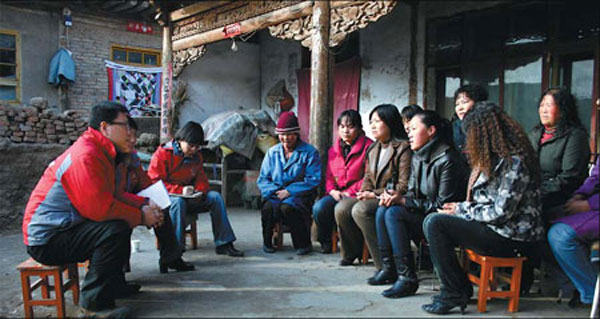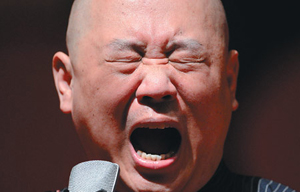'Spring' in the air for NGOs?
Updated: 2013-04-17 13:26
By Tang Yue and He Dan in Beijing (China Daily)
|
||||||||
 |
|
Staff from Beijing Zhongze Women's Legal Counseling and Service Center talk with rural women in Qinghai in 2009. Provided to China Daily |
Welcome news
Last month's National People's Congress, the most important annual event in the country's political calendar, brought some welcome news. Four types of NGO - industrial associations, charities, community services and organizations dedicated to the promotion of technology - will soon be allowed to register directly and without the need to find a government backer. It's expected that details of the new registration policy will be unveiled by the end of the year.
NGOs have greeted the news with cautious optimism, but they admit to concerns about the implementation of the new policy and the limited scope of direct registration.
Meanwhile, academics regard the new rules as an indication of the new leadership's vision of the State's relationship with society, and of its intention to extend the roles played by NGOs and individuals in the world's second-largest economy.
"We have repeatedly heard 'spring is coming for NGOs' for many years but have always felt let down. But, this time, I think it really is coming," said Deng Guosheng, a professor who specializes in NGO studies at Tsinghua University. "Before, we had hints from the Ministry of Civil Affairs, but this time round it's a NPC decision, one with legal backup."
Wang Ming, Deng's fellow researcher at Tsinghua, said the reform of the registration system reflects a fundamental shift in official attitudes toward civil societies and marks the starting point in another round of social reform, following the market-oriented reforms that began in 1978.
"The government has long operated from the perspective of a total State, overseeing everything that happens in the country and regarding NGOs as a challenge to its authority," said Wang. "Now, it increasingly sees NGOs as a cooperative 'third sector', in addition to the roles played by the government and business.
For Wang, the realization of "small government, great society" is a three-step process. The reform of the registration system is the first step, one that ensures the right to free association.
The second step will involve allowing NGOs and businesses to become the main suppliers of social services. The final move will be to encourage public self-governance.
"The current system politicizes some issues that could be resolved through low-level negotiation and community action. Problems shouldn't be a cause of disharmony between the people and the government," Wang said.

 'Taken 2' grabs movie box office crown
'Taken 2' grabs movie box office crown
 Rihanna's 'Diamonds' tops UK pop chart
Rihanna's 'Diamonds' tops UK pop chart
 Fans get look at vintage Rolling Stones
Fans get look at vintage Rolling Stones
 Celebrities attend Power of Women event
Celebrities attend Power of Women event
 Ang Lee breaks 'every rule' to make unlikely new Life of Pi film
Ang Lee breaks 'every rule' to make unlikely new Life of Pi film
 Rihanna almost thrown out of nightclub
Rihanna almost thrown out of nightclub
 'Dark Knight' wins weekend box office
'Dark Knight' wins weekend box office
 'Total Recall' stars gather in Beverly Hills
'Total Recall' stars gather in Beverly Hills
Most Viewed
Editor's Picks

|

|

|

|

|

|
Today's Top News
Boston bombing suspect reported cornered on boat
7.0-magnitude quake hits Sichuan
Cross-talk artist helps to spread the word
'Green' awareness levels drop in Beijing
Palace Museum spruces up
First couple on Time's list of most influential
H7N9 flu transmission studied
Trading channels 'need to broaden'
US Weekly

|

|









